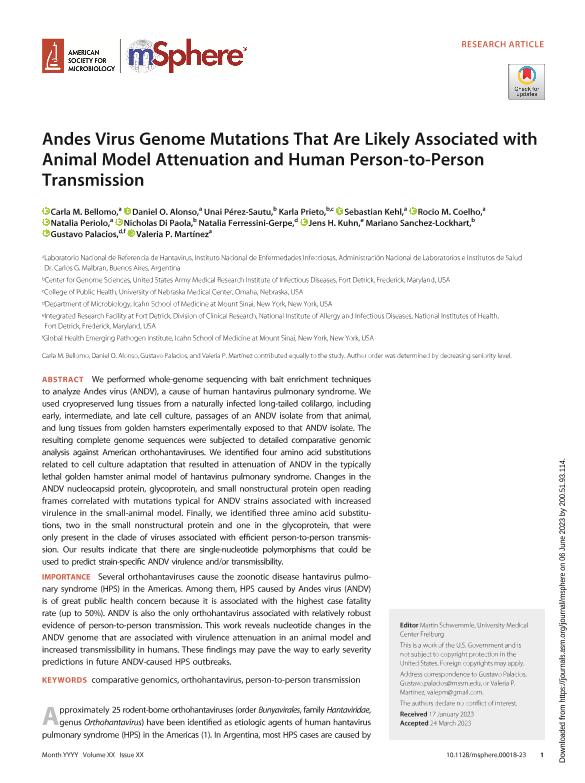Artículo
Andes Virus Genome Mutations That Are Likely Associated with Animal Model Attenuation and Human Person-to-Person Transmission
Bellomo, Carla María; Alonso, Daniel O.; Pérez Sautu, Unai; Prieto, Karla; Kehl, Sebastian Dario; Coelho, Rocío María; Periolo, Natalia ; Di Paola, Nicholas; Ferressini Gerpe, Natalia; Kuhn, Jens H.; Sanchez Lockhart, Mariano; Palacios, Gustavo; Martinez, Valeria Paula
; Di Paola, Nicholas; Ferressini Gerpe, Natalia; Kuhn, Jens H.; Sanchez Lockhart, Mariano; Palacios, Gustavo; Martinez, Valeria Paula
 ; Di Paola, Nicholas; Ferressini Gerpe, Natalia; Kuhn, Jens H.; Sanchez Lockhart, Mariano; Palacios, Gustavo; Martinez, Valeria Paula
; Di Paola, Nicholas; Ferressini Gerpe, Natalia; Kuhn, Jens H.; Sanchez Lockhart, Mariano; Palacios, Gustavo; Martinez, Valeria Paula
Fecha de publicación:
04/2023
Editorial:
American Society for Microbiology
Revista:
mSphere
ISSN:
2379-5042
Idioma:
Inglés
Tipo de recurso:
Artículo publicado
Clasificación temática:
Resumen
We performed whole-genome sequencing with bait enrichment techniques to analyze Andes virus (ANDV), a cause of human hantavirus pulmonary syndrome. We used cryopreserved lung tissues from a naturally infected long-tailed colilargo, including early, intermediate, and late cell culture, passages of an ANDV isolate from that animal, and lung tissues from golden hamsters experimentally exposed to that ANDV isolate. The resulting complete genome sequences were subjected to detailed comparative genomic analysis against American orthohantaviruses. We identified four amino acid substitutions related to cell culture adaptation that resulted in attenuation of ANDV in the typically lethal golden hamster animal model of hantavirus pulmonary syndrome. Changes in the ANDV nucleocapsid protein, glycoprotein, and small nonstructural protein open reading frames correlated with mutations typical for ANDV strains associated with increased virulence in the small-animal model. Finally, we identified three amino acid substitutions, two in the small nonstructural protein and one in the glycoprotein, that were only present in the clade of viruses associated with efficient person-to-person transmission. Our results indicate that there are single-nucleotide polymorphisms that could be used to predict strain-specific ANDV virulence and/or transmissibility. IMPORTANCE Several orthohantaviruses cause the zoonotic disease hantavirus pulmonary syndrome (HPS) in the Americas. Among them, HPS caused by Andes virus (ANDV) is of great public health concern because it is associated with the highest case fatality rate (up to 50%). ANDV is also the only orthohantavirus associated with relatively robust evidence of person-to-person transmission. This work reveals nucleotide changes in the ANDV genome that are associated with virulence attenuation in an animal model and increased transmissibility in humans. These findings may pave the way to early severity predictions in future ANDV-caused HPS outbreaks.
Palabras clave:
COMPARATIVE GENOMICS
,
ORTHOHANTAVIRUS
,
PERSON-TO-PERSON TRANSMISSION
Archivos asociados
Licencia
Identificadores
Colecciones
Articulos(SEDE CENTRAL)
Articulos de SEDE CENTRAL
Articulos de SEDE CENTRAL
Citación
Bellomo, Carla María; Alonso, Daniel O.; Pérez Sautu, Unai; Prieto, Karla; Kehl, Sebastian Dario; et al.; Andes Virus Genome Mutations That Are Likely Associated with Animal Model Attenuation and Human Person-to-Person Transmission; American Society for Microbiology; mSphere; 8; 3; 4-2023; 1-14
Compartir
Altmétricas



